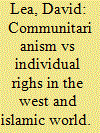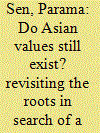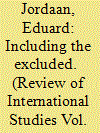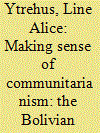| Srl | Item |
| 1 |
ID:
062171


|
|
|
| 2 |
ID:
151202


|
|
|
|
|
| Summary/Abstract |
In a world ripped with conflicting issues stemming from varying interests and pressing common concerns, the role of culture and tradition seems to have gained greater salience. At the core of Asia’s cultural assertiveness lies the concept on Asian values. Claimed to be rooted in Confucianism, the discourse appeals to the communitarian Asian tradition pitting it against the individualism of the West. While the use of the concept to explain the economic prosperity of East and Southeast Asia and as a counterforce to globalisation was thwarted by the Asian financial crisis, the belief that Asia and Asians subscribed to a value system fundamentally different from that of the West lingered on. This article seeks to analyse the contemporary relevance of the concept of Asian values and delve into its roots in an attempt to attune it to current realities.
|
|
|
|
|
|
|
|
|
|
|
|
|
|
|
|
| 3 |
ID:
108506


|
|
|
|
|
| Publication |
2011.
|
| Summary/Abstract |
Cosmopolitanism is frequently criticised for overlooking the situatedness of morality and the importance of solidarity in their aspiration to global justice. A number of thinkers take these criticisms seriously and pursue 'a communitarian path to cosmopolitanism'. Four such approaches are considered. All four view morality and justice as grounded in a specific social setting and hold that justice is more likely to result if there is some 'we-feeling' among people, but are simultaneously committed to expanding the realm of justice and moral concern to beyond national boundaries. To enable the theorisation of an expanded realm of situated justice and moral concern, community is conceived as not necessarily corresponding to political boundaries and the moral the self is seen as able and eager to loosen some of its traditional moral connections and to form new ones. Unfortunately, these approaches are likely to exclude significant segments of the world's population from the expanded realm of moral concern they theorise, most notably, a large proportion of the world's poor. It is suggested that the thought of Emmanuel Levinas might offer a way of reducing the gap between solidarity and moral universalism.
|
|
|
|
|
|
|
|
|
|
|
|
|
|
|
|
| 4 |
ID:
166694


|
|
|
|
|
| Summary/Abstract |
In Bolivia, the state and society is undergoing radical transformations. The indigenous movements have revitalised traditions such as communitarianism, and ‘communitarian development’ has come to the forefront of Bolivian politics. The aim of this article is to identify what communitarian development means in the Bolivian context; how it is conceived and how it is practiced. I examine how communitarian development is conceptualised in the Aymara indigenous movement and in policy documents, and analyse what communitarianism might mean to people who uphold such values. I identify and discuss five different but intertwined significations; communitarian economy, communitarian work, communitarian management, communitarian law and communitarian values. I show that Bolivian communitarianism contains conceptualisations of cultural phenomena, which emerge at the nexus of experiences and expectations for the future, and argue that, despite tensions and pitfalls, communitarian development has the potential to increase indigenous wellbeing and agency and to contribute to a more nuanced understanding of what communitarianism is, or could be.
|
|
|
|
|
|
|
|
|
|
|
|
|
|
|
|